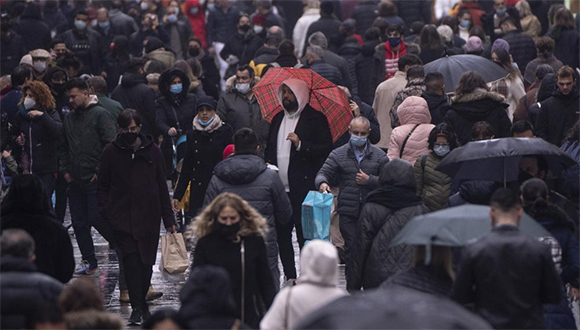Passing by in Madrid, on December 24, 2021. Spain, like other countries, is experiencing a rebound in injuries at the end of the year. Photo: AP.
Like other regions of the world, the Americas is experiencing the final days of 2021 with a continuous increase in cases of the COVID-19 virus. The spread of the omicron type of SARS-CoV-2 and the high number of infections have led to the cancellation of thousands of flights, while the authorities are evaluating new measures to deal with the epidemic.
The World Health Organization (WHO) has already recorded 276.4 million infections and 5.37 million deaths from COVID-19 globally. America remains the worst-affected region in the world, with 36% of cases (100.5 million infected) and nearly 45% of deaths (2.4 million).
Of these, nearly half of the infections (46.2 million) and 62% of the deaths (1.55 million) were recorded in Latin America.
The Pan American Health Organization (PAHO) has warned of the situation on the continent, which is about to enter the third year of the epidemic with a continuous increase in cases of COVID-19, especially in North America, where last week saw an increase. In the number of 36% of injuries.
Meanwhile, there was a decrease in cases and deaths in regions of Central and South America, although countries such as Bolivia reported a significant weekly increase in infections (13%), while they also increased in Ecuador and Argentina, albeit to a lesser extent.
According to the latest reports, cases of the omicron variant have been reported in a number of territories and countries in America, including Argentina, Bermuda, Brazil, Canada, Chile, Colombia, Costa Rica, Cuba, Ecuador, the United States, Guadeloupe, French Guiana, Cayman Islands, Mexico, Panama, Peru, Puerto Rico, Saint Martin , and Trinidad and Tobago.
They are joined by the Dominican Republic, which reported a case last Saturday, and Paraguay, where the government on Monday reported its first infections with the omicron variant: three travelers from Cancun, Mexico.
The continent remains on alert for this variant, which has already been detected in more than 110 countries around the world and continues to spread dramatically, doubling cases in the communities where it is transmitted within two or three days, according to WHO.
This Monday, major US airlines canceled more than 1,000 flights for a fourth day in a row due to alternative progress, according to Flight Aware, a company that publishes real-time flight information.
Last Sunday, 1,517 planes were grounded, on Saturday a thousand more planes bound for the US didn’t take off or leave, and on Friday, Christmas Eve, 700 planes were left in hangars, according to Flight Aware.
According to the Associated Press, flight delays and cancellations related to staff shortages have been common this year in the United States.
The US agency states that airlines encouraged workers to resign in 2020, when air transport was paralyzed, and those companies struggled to be competitive this year, when air travel was reactivated faster than expected, and in recent weeks the arrival of Omicron has exacerbated the situation. Problem.
“During the pandemic, we have seen experienced individuals never leave the sector, all over the world,” said John Grant, an analyst at OAG, which specializes in research in the travel sector. “Filling these gaps with trained personnel was already a challenge in recovery before the last alternative emerged.”
But Henry Hartfeldt, travel analyst at Atmosphere research group, said airline staffing levels are “irrelevant” when Omicron is added to the cocktail. We cannot claim that the problems we are seeing now are due to not having enough staff to work for airlines. What we see happening is that employees who were available to work have contracted Covid disease.”
In the United States, the government’s lead epidemiologist, Anthony Fauci, said on Monday that the Joe Biden administration was “seriously” evaluating reducing isolation time for those who had contracted the virus and deemed it would be “reasonable to evaluate.” Imposing new vaccination requirements on domestic flights.
Omicron is the predominant variant in the United States, where it causes more than 70% of infections, according to the Centers for Disease Control and Prevention (CDC).
Infections recover in Spain, regions analyze new restrictions
Spain is dealing with the largest number of infections with the Corona virus and some regions are considering implementing new restrictions on social life before the end of the year.
Updating the epidemic numbers for the first time in four days, health authorities reported 214,619 new cases late Monday, raising the national number of cases in 14 days to an epidemic record of 1,206 new infections per 100,000 inhabitants.
At the height of the wave of infections in January, which so far has infected the majority of people in Spain, the rate rose to 900.
The explosive spike is largely attributed to the omicron variant, which scientists say is spreading faster than previous spikes, although relatively fewer infected patients required hospital care than in previous outbreaks.
Official data shows that 7.5% of Spanish hospital beds and 18% of intensive care units treat Covid patients.
Authorities have reported 120 new deaths since December 23.
In response to the growing number of cases, some Spanish regions are now considering implementing restrictions, measures they resisted just a week ago, when authorities imposed the mandatory use of only outdoor masks.
The northern regions of Navarre, Aragon and Cantabria, among others, are limiting nightlife, imposing curfews or evaluating the maximum limits for different family members allowed to congregate.
France announces new measures to limit the spread of the virus
On Monday, the French government announced new measures to limit the spread of the Corona virus, but it did not impose strict restrictions before the end of the year.
Starting next week, mass events will be limited to 2,000 people indoors and 5,000 people outdoors. French Prime Minister Jean Castex said people will be asked to stay in their seats during concerts and patrons will not be able to stand in bars.
Eating and drinking will be prohibited in cinemas, theaters, sports facilities and public transportation, including long-distance routes. He added that working from home will be mandatory at least three days a week for employees whose duties make it possible.
Castix stated that the new rules will be in effect for at least three weeks.
This step comes after France recorded more than 100,000 cases of the virus in one day, for the first time in light of the epidemic.
The new measures are still less stringent than those passed in December last year, when a night-time curfew was imposed across the country.
Castex made basic recommendations for New Year’s Eve, including avoiding large parties and dinners, wearing a mask, ventilating rooms, and taking a diagnostic test.
The French prime minister confirmed the reopening of schools as scheduled on January 3, and assured that political campaigns would not be affected by the new rules for democratic reasons ahead of the presidential elections in April.
More than one in 100 people in the Paris region have tested positive for the coronavirus in the past week, according to the regional health service. Most of the new infections are related to the omicron formula, which government experts expect will be the dominant boom in France in the coming days.
In France, a bill to create a special permit will be put to a vote next month that will allow only vaccinated people to enter public places, including restaurants, bars and cinemas.
More restrictions in European countries
As the omicron variant of coronavirus spreads around the world before the New Year, governments are implementing measures of varying levels of urgency to contain this plague. Some immediately reimposed restrictions, but others are still analyzing steps to take in the face of people’s need to live their holidays in peace.
In Britain, where the highly contagious type of coronavirus has sent cases to new levels, Health Minister Sajid Javid said on Monday that no further restrictions would be implemented in England before the new year, but “when we get to the new year we’ll see what happens.” If we need to take additional measures.”
The number of new infections in that country is about 100,000 per day, and hospitalizations are up more than 70% at Christmas compared to the previous week.
However, in other parts of Britain, nightclubs have been ordered to close and meetings restricted in Scotland, Northern Ireland and Wales, leaving the country divided over how to deal with the crisis.
Meanwhile, the Netherlands has already closed all non-essential shops, restaurants and bars, and extended school holidays in what largely amounts to a new closure.
In Belgium, new measures came into effect over the weekend and Monday: shopping in large groups was banned, cinemas and concert halls closed in the middle of the end-of-year season.
In Greece, authorities announced additional restrictions against the coronavirus on Monday after 9,284 confirmed infections were reported in one day, the highest number since the start of the pandemic.
The Minister of Health, Thanos Blevris, announced that from January 3, the mandatory use of double or high-protection protective masks will be imposed in supermarkets and public transport.
In addition, recreation centers will be closed at midnight, capacity in football stadiums will be reduced to 10%, remote work will be expanded and changes scheduled in the public sector, and only people with a negative PCR test will be allowed to visit shelters for the elderly.
“The variant of Omicron is now evident across the country, especially in downtown Athens where there has been a significant increase in cases,” Blifris said.
He added that the new restrictions would come into effect after the New Year amid concerns that if they were implemented earlier, it would lead to an increase in private meetings.
(With information from AP and EFE)

“Unapologetic tv specialist. Hardcore zombie trailblazer. Infuriatingly humble problem solver.”







More Stories
News summary of tensions with Iran and Israel's war in Gaza for April 25, 2024
Indigenous people in Brazil march for their land rights
The protests rocking campuses across the United States are not only demanding an end to the war in Gaza;